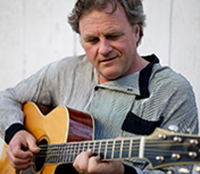 H
H

About Harvey Reid...Songwriter, multi-instrumentalist, writer and music educator Harvey Reid has honed his craft since the 1970's in countless clubs, festivals, streetcorners, cafes, schools and concert halls across the nation. He has been called a "giant of the steel strings" and "one of the true treasures of American acoustic music," and is considered to be one of the modern masters and innovators of the acoustic guitar, autoharp and 6-string banjo. He has absorbed a vast repertoire of American contemporary and roots music and woven it into his own colorful, personal and distinctive style. His 32 recordings on the Woodpecker record label showcase his mastery of many instruments and styles of acoustic music, from hip folk to slashing slide guitar blues to bluegrass, old-time, Celtic, ragtime, and even classical. He was inducted in 2023 into the Maine Music Awards Hall of Fame. Reid is also the author of dozens of music education books as well as an important visionary and pioneer in today's music landscape. His epic book "The Troubadour Chronicles," published in 2020, blazes a new trail in music history and education, establishing and exploring the field of modern troubadour education. Reid is also the discoverer of the Liberty Guitar Method, a ground-breaking advance in simplified guitar. Reid's skills and versatility on the guitar alone mark him as an important voice and one of the deepest artists in acoustic music. He won the 1981 National Fingerpicking Guitar Competition and the 1982 International Autoharp competition. Yet he's also a veteran musician with a long list of studio and band credits, a strong flatpicker who has won Bill Monroe's Beanblossom bluegrass guitar contest, a versatile and engaging singer, a powerful lyricist, prolific composer, arranger and songwriter, a solid mandolin, mandocello and bouzouki player, as well as a seasoned performer and captivating entertainer. Reid started playing guitar in his early
teens in Maryland, and fell in with the now-legendary DC-area bluegrass
scene. After street-fiddling and playing old-time and bluegrass music for close
to 9 years, he moved into his van in the late 1970's and began pursuing solo acoustic
songs and instrumental music, primarily fingerstyle acoustic guitar and autoharp.
After stints in a bluegrass band in Colorado, playing electric guitar in a country
band in Virginia, and a winter in Nashville, Reid migrated to Northern New England,
playing 5 nights a week on the "blue-collar" folk circuit in Maine and
New Hampshire, while developing his own personal blend of American acoustic music. Reid has also made his mark on the acoustic music world in other ways. He is responsible for most of what is known about the partial capo, developed all of the popular partial-capo configurations in use today, (including the Esus) was the first to record and publish music for partial capo. In 1980 he co-founded the Third Hand Capo Co. and wrote the first college textbook for folk guitar, titled Modern Folk Guitar, published by Random House. Reid probably published the first desktop-published book (in 1980) and likely was the first acoustic independent musician to release a CD. He was certainly was among the first to make all-digital recordings, and helped usher in the new era of "indie" recording with a series of articles he wrote for acoustic music magazines. He was also the first artist to endorse Taylor Guitars, and began doing promotion for them in 1983. Reid's success "under the radar" has become a role model for a large number of young, independent musicians who want to pursue their careers outside the music industry. Reid's series of Capo Voodoo books and recordings are the definitive guides to the fascinating world of partial capos, and his unveiling of the Liberty guitar tuning in 2014 marks an important new discovery in the guitar fingerboard and a landmark in beginning guitar instruction. Reid is currently finishing a very ambitious series of music education projects that now includes almost 30 books, including the definitive chord books for guitar, banjo, DADGAD tuning, Orkney tuning, octave mandolin, baritone ukulele and mandocello. A Musical Biography of Harvey Reid
"...one of the true treasures of American acoustic music ." ACOUSTIC GUITAR MAGAZINE "Reid is truly a giant of the steel strings...wonderful twists of originality and emotional depth... a wealth of techniques and ideas." GUITAR PLAYER MAGAZINE. "Harvey Reid is a one-man history of acoustic music." The Missoulian "...a
folk-style artist deserving of wider popular recognition... Unlike some virtuosos,
he brings wit and panache as well as technique to his music." BOSTON GLOBE |

